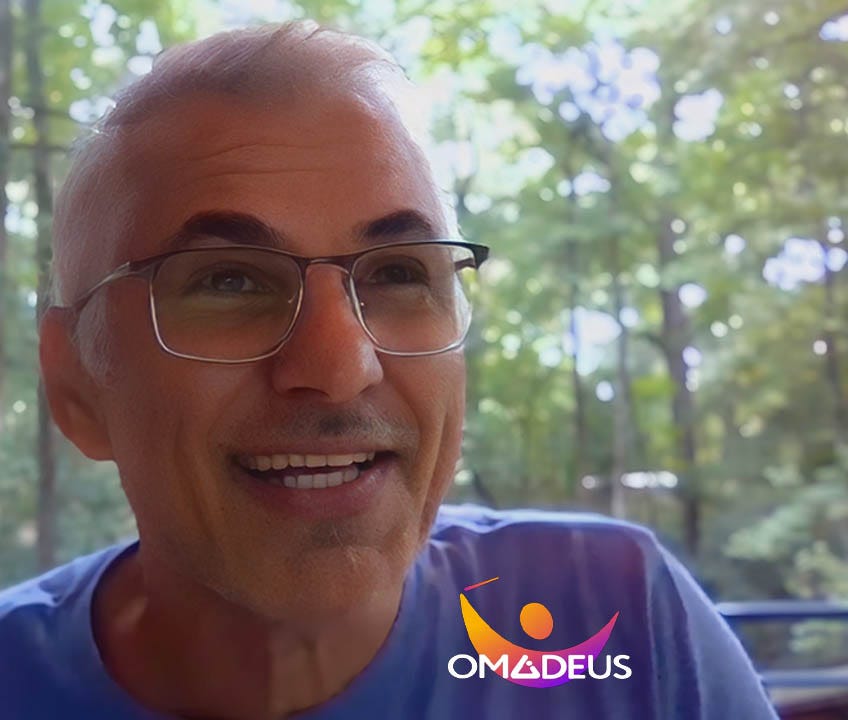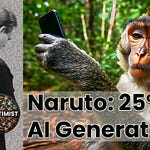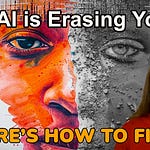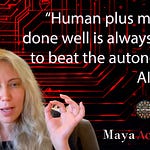Forget the ChatGPT hype. Forget the endless debates about AGI. Meet a true visionary in the tech world, Massoud Alibakhsh, CEO and co-founder of Omadeus.
Massoud's here to tell us why we've been looking at AI all wrong, and how a simple shift in perspective could revolutionize the way we build and use software.
"Intelligence is embedded in everything in our world. We are living in distributive intelligence," Massoud tells me, his eyes lighting up with enthusiasm.
It's this profound observation that led him to develop a groundbreaking approach to AI agents - one that's as organic as it is technical.
Picture this: instead of one big, all-knowing AI brain trying to run your entire business, imagine if every part of your operation had its own mini-AI agent.
Each document, each spreadsheet, each meeting - all with their own specialized intelligence. Sounds wild, right?
But according to Massoud, it's not just possible - it's the future.
"It's like each object has its own ChatGPT designed for its tasks and the people involved," he explains.
And suddenly, I'm seeing the business world in a whole new light. No more disconnected silos.
No more endless chains of lifeless, laborious emails. Just smart, efficient objects doing what they do best.
While the rest of the tech world is busy trying to make AI mimic human tasks, Massoud's flipping the script.
"First AI movers are looking at automating what people do - organizing and reporting, which is an ancient practice.
AI can do all of this, if you move from the people and down to the actual objects they are working on."
It's a Darwinian leap in efficiency, and it's so beautifully simple that you have to wonder - why isn't everyone doing this?
As we dive deeper into Massoud's organic AI model, I can't help but feel we're on the cusp of something big.
Something that could change the way we interact with technology.
Best part? It's inspired by the most brilliant system we know - nature itself.
We're about to take a wild ride through the world of intelligent objects, swarms of micro-ChatGPTs, and a future where your spreadsheet might just be smarter than you are.
In this episode of The AI Optimist, I sat down with Massoud Alibakhsh, CEO and co-founder of Omadeus, to explore the revolutionary world of AI agents and their potential to transform business operations.
With three successful exits and a deep understanding of managing diverse tech products across platforms, Massoud brings a wealth of experience to the table as he tackles the AI integration puzzle.
The Evolution of AI Agents: Breaking Free from Old Software Habits
Massoud challenges the conventional wisdom surrounding AI integration in software.
He argues that the industry's current approach to AI is fundamentally flawed, focusing too heavily on large language models (LLMs) and neglecting the potential of smaller, more specialized AI agents.
Massoud explains,
"LLMs, the whole hype about them turning into AGI and solving all the problems.
That's a pipe dream, okay?
And whoever talks like that, they really, really, haven't thought about the problem or they don't really have expertise."
Instead of relying on a single, all-encompassing AI system, Massoud proposes a more organic approach inspired by nature itself.
He envisions a world where each component of a software system has its own specialized AI agent, working in harmony to create a more efficient and effective whole.
"If you imagine your system organized hierarchically, just like our biology is that each agent has its own intelligence, his own information, and it can actually transmit its experiences to the higher level, to the, to the liver and the liver, to the brain,"
Massoud illustrates.
This revolutionary approach challenges the status quo, moving away from form-based applications and towards what Massoud calls "object-centric design."
In this newmodel, the critical entity in a business process becomes an intelligent object with its own communication channels and AI capabilities.
The Power of Collaboration: Mini ChatGPTs Designed for Business
As we explore the potential of this new approach, Massoud introduces the concept of "mini ChatGPTs" designed specifically for the objects driving business.
Rather than relying on a single, monolithic AI system, Massoud envisions a world where each business object has its own specialized AI agent.
Instead of one LLM to do everything. Mini ChatGPTs designed for the objects driving business.
The Darwinian leap is making objects intelligent, which brings lightning fast efficiency because the object coordinates it all and is super intelligent.
This approach offers several advantages over traditional AI integration:
1. Improved efficiency: By focusing on the specific needs of each business object, these mini-AI agents work more quickly and effectively than a generalized system.
2. Reduced complexity: Instead of trying to create a single AI system that understands every aspect of a business, each mini-AI agent only needs to understand its specific object.
And the knowledge, domain, and stakeholders related to this object, so it can coordinate updating, reporting, and organizing all activity around the object.
3. Enhanced scalability: As businesses grow and change, new AI agents can be added or modified without affecting the entire system.
4. Better data management: Each AI agent can be designed to handle sensitive information appropriately, ensuring better compliance with regulations like HIPAA.
First AI movers are looking at automating what people do, which is organizing and reporting an ancient practice.
AI can do all of this if you move from helping people do what they're already doing and down to the actual objects, they can take the load off of people and do it better.
Overcoming AI Agent Challenges: From Chaos to Coordination
As exciting as this new approach sounds, it's natural to wonder about the potential for chaos in such a distributed system.
How can we prevent these mini-AI agents from creating an unmanageable, tangled mess?
Massoud addresses this concern head-on, explaining that careful design and planning are crucial to the success of this approach.
"Obviously, you really need careful design planning for this, right?
This is ultimately, what's wonderful is that you're not going to let LLMs run wild and make decisions on their own.
What you're doing is really constraining each tiny little language model to the data entity that they're dealing with."
He goes on to describe how this model naturally lends itself to better information management and compliance:
"Imagine if each data element knows the type of stakeholders, if I'm if I'm an x ray, for example, and I know you're the doctor and I'm programmed ahead of time knowing what kind of information I can share with you or I know, I'm supposed to go read the HIPAA that was just published because I'm a system."
This level of granular control allows for better security, compliance, and overall system management.
By designing the system from the ground up with these considerations in mind, Massoud argues that we can create AI-integrated software that is both powerful and responsible.
The Human Touch: Making AI Accessible to Non-Technical Users
One of the most compelling aspects of Massoud's vision is its potential to make AI more accessible to non-technical users.
By moving away from traditional form-based interfaces and towards a more natural, conversational interaction model, Massoud believes we can create software that is truly user-friendly.
"The user friendliness of the system is that you can just walk up to it and start talking,"
"So you can talk to the system and sometimes you can even click on it and it says here, here's a list.
You can I could show it to you, or you can click on and I'll take you to that section of the program."
This approach combines the best of both worlds: the natural language processing capabilities of AI with the visual and organizational strengths of traditional software interfaces.
The result is a system that can adapt to the user's needs and preferences, rather than forcing the user to adapt to the software.
Massoud emphasizes the importance of this user-centric approach,
"The systems are going to be a hybrid of graphical user interface, but they're all going to have a human interface where you can just walk up to it.
And once you log in, it knows who you are and there's what you have access to."
The Road Ahead: Challenges and Opportunities
Massoud's vision for the future of AI-integrated software is both ambitious and exciting. However, he's also realistic about the challenges that lie ahead.
One of the biggest hurdles is changing the mindset of the industry, which has become fixated on large language models and generalized AI systems.

Massoud argues that this approach is fundamentally flawed, stating,
"The software problem is going to be solved by rethinking building software from, first principle with the view of the existence and the capabilities of AI."
He also acknowledges that implementing this new direction will require a significant shift in how we design and develop software.
"The job of the software developer is not over, the designers and software engineers is going to have to come and have to basically, embed their understanding, full understanding of these silos and how information needs to be shared with whom and what the rules are."
Despite these challenges, Massoud remains optimistic about the future.
He sees this new approach as a natural evolution of software development, one that will ultimately lead to more efficient, effective, and user-friendly systems.
"We are basically implementing and giving those rules to the data.
And once you do that, if you can imagine every object is self-behaving, self-disciplining, self-organizing and self-regulating, if you will.
And on top of that you can have engines that reason. So these are the next layers," Massoud explains.
A New AI Integration
We’re standing on the brink of a new era in software development and AI integration.
By moving away from monolithic AI systems and towards a more distributed, object-centric approach, we can create software that is not only more powerful but also more intuitive and user-friendly.
Massoud's vision challenges us to rethink our assumptions about AI and software development.
Instead of trying to create a single, all-knowing AI system, he encourages us to embrace the power of collaboration and specialization.
By giving each component of our software its own miniature AI agent, we can create systems that are more efficient, more scalable, and better suited to the complex needs of modern businesses.
By focusing on the needs of users, embracing the power of specialized AI agents, and designing our systems with care and foresight, we can create a new generation of software that truly harnesses the power of AI to improve our lives and businesses.
As we continue to explore and refine these new approaches, we have the opportunity to create a world where technology truly works for us, rather than the other way around.














